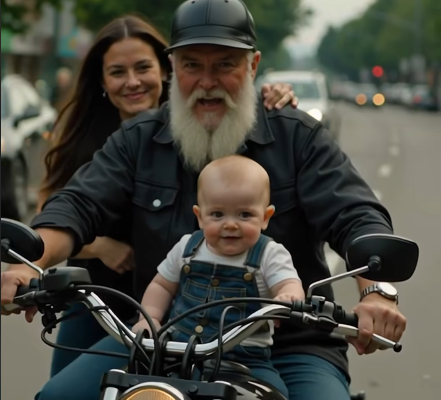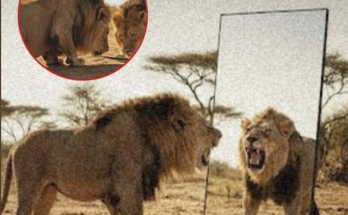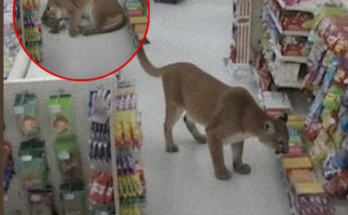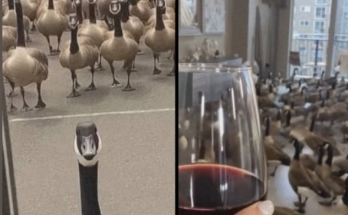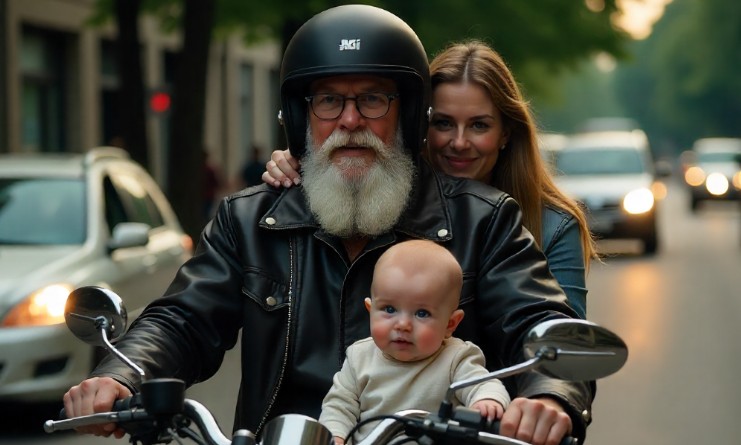
A huge biker smashed through every rule of the road the day he raced a fading baby to the hospital. It started in a Walmart parking lot. He had rolled up on his loud Harley, expecting a normal stop, when he spotted a teenage girl holding her tiny daughter. The baby’s skin was turning blue. The child was limp, no breath moving her chest. Shocked shoppers circled them, phones out, recording. No one stepped forward to help.
The biker, a mountain of a man everyone called Tank, pushed past the ring of onlookers. His leather vest creaked as he knelt, his thick beard brushing the baby’s blanket. Tank weighed around three hundred pounds and, on first look, he scared people. Tattoos covered his arms and his throat—ugly symbols, even a swastika. A “1%” patch warned that he rode with outlaws. Yet in that instant, none of it mattered. He checked the child’s pulse, found none, and began infant CPR.
His hands, huge enough to snap a steering wheel, moved like feathers. Two fingers pressed the baby’s tiny chest, then tiny breaths from his powerful lungs filled her airways. He counted soft compressions while the young mother screamed and sobbed. “Help her! Please!” she begged the crowd. They only kept filming, backs stiff, afraid to touch the dying girl.
Tank pumped and breathed for eight endless minutes. Sweat dripped down his temples. His knees hurt, but he kept the rhythm: push, push, breathe. After what felt like forever, the baby shuddered, coughed, and let out a thin cry. Color rushed back to her cheeks. The mother collapsed in relief. Tank wrapped the infant in his arms, nodded to the girl, and barked to his brothers—other bikers from the Redeemed Riders Motorcycle Club who had been shopping nearby.
They formed a roaring shield of steel and chrome around Tank’s bike. The teen mom climbed on behind him, clutching his cut like a lifeline. Tank revved the engine and blasted out of the lot. Red lights, stop signs, speed limits—none of those mattered now. He punched the throttle to ninety miles an hour. Cars swerved away as the club blocked lanes, making a moving tunnel all the way to County General.
At the emergency entrance, a security guard tried to stop them. He saw Tank’s tattoos, the hard eyes, the outlaw patch, and raised a hand. Tank’s voice thundered over his idling engine: “Move or this child dies!” The guard stepped back as Tank strode in, baby cradled in one arm like priceless glass.
Doctors rushed them down a hall. Minutes later they told Tank and the girl—whose name was Alyssa—that the child would live. Three more minutes without oxygen would have ended her life. Alyssa broke down, gripping Tank’s calloused hand while his shoulders shook with silent tears.
“Everyone just stood there,” she repeated, eyes red. “All those people filming… only you helped. Only you cared.”
What Alyssa did not know, what the ER staff did not know, what the world would soon discover when local news trucks showed up, was why a man who looked so dangerous knew exactly how to save an infant. Why would he risk parole by blowing through red lights? Why would someone covered in hate symbols fight so hard to save a Black baby?
Fifteen years earlier, Tank had taken a child’s life. He had driven drunk and crashed into a family car, killing a three‑year‑old boy named Jerome. Tank went to prison for it. Behind bars, he wore his racist tattoos like armor, convinced hatred would numb his guilt. Instead, he met Big Jim, a Black inmate serving life who ran the prison library. Jim looked past Tank’s ink and saw a broken soul.
“You can’t raise that boy from the grave,” Big Jim told him. “But you can spend the rest of your days stacking weight on the good side of the scale.”
Big Jim taught Tank to read more than biker mags—he handed him medical manuals and urged him into every first‑aid class the prison offered. Tank earned an infant CPR certificate two weeks before Jim died of cancer. Jim’s last words in a letter: “Learn it well. One day God might hand you the life you took and ask what you’ll do.”
Two years ago Tank got out. He could not afford laser removal of the swastika. No shop wanted to hire him. White supremacists shunned him because he had turned his back on hate. The only group that opened a door was the Redeemed Riders—a club of ex‑cons trying to walk the straight path. They gave him a bike, brotherhood, and purpose.
All of that led to the Walmart parking lot, to the baby who now slept peacefully while Alyssa stroked her cheek. Reporters crowded the waiting room. Tank tried to leave quietly, but Alyssa grabbed his sleeve.
“Please,” she said. “They need to hear why you did this. People need to know the truth.”
Tank faced the cameras. He knew his parole officer would see the footage. He knew flashing the tattoos on TV would bring storms. Still, he spoke.
“I’m not a hero,” he said. “Fifteen years ago I killed a child while I was drunk. These tattoos are from that time. I keep them because I can’t pay to remove them, and because they remind me of what I must never be again.” His voice cracked. “Today I got a chance to give life instead of taking it. That’s all.”
He pointed to the twenty Redeemed Riders standing in the back. “Those men kept us safe on the road. They’re heroes too.”
A reporter asked if Tank really had threatened the security guard. Alyssa stepped forward, fiery. “My baby was dying. He was trying to save her. People judged him by how he looks while they pointed phones at us. Tell the world what real help looks like.”
The story went viral within hours. Clips of bystanders filming while Tank worked CPR filled social feeds. Comments slammed the “respectable folks” who did nothing and praised the “scary biker” who did everything.
Three days later, Tank was hauling bricks at a construction site when his boss waved him over. A woman waited by the gate, holding a teenage boy’s hand. Tank knew her face before she spoke.
“You’re Marcus Williams,” she said, using his birth name. Her eyes held grief and iron. “You killed my son Jerome.”
The ground tilted under Tank’s boots. He wanted to sink into the dirt. “Yes, ma’am,” he murmured. “I’m sorry… I’m so sorry.”
She looked at his tattoos, the scarred knuckles, the pain in his eyes. “I saw you on the news. Saw you save that little girl.”
“It doesn’t fix anything,” he whispered.
“No. Nothing will bring Jerome back. He would’ve graduated this year.” Her voice wavered but did not break. “I’ve carried hate for you like a stone in my chest. When I saw your ink, I thought God showed me the monster who stole my baby. But then I watched you breathe life into that child. I realized my hate was killing me.”
She nodded to the teenage boy—Jerome’s younger brother, born after the crash. “I can’t forgive you. Not yet. Maybe never. But I need you to keep saving others. Not for me, not for any reward. Just so some mother out there never feels what I feel.”
She walked away, leaving Tank shaking. He cried in his truck until his foreman, not knowing the reason, sent him home early.
That weekend, the Redeemed Riders launched free infant CPR classes. They put flyers in every laundromat and diner. Tank led the first class for five curious residents. The next weekend fifty people came, including some who had filmed the Walmart incident. By the third weekend, they rented a community hall, welcoming hundreds.
Tank stood before them, tattoos on display, showing fingers on tiny manikins, counting compressions out loud. The marks on his skin no longer pushed people away; they reminded the audience that even someone marked by hate could learn to heal.
A year passed. Miracle—Alyssa had renamed her baby—turned one. At her birthday picnic, Tank sat among an unlikely crowd: Alyssa and Miracle, the Redeemed Riders, dozens who had taken their CPR course, even the teenage brother of Jerome. They laughed, shared burgers, and told stories of lives saved because a biker club taught them what to do.
Tank still wore the swastika. Removal cost too much, and any spare cash fed the CPR program. Yet at that party no one saw the symbol anymore. They saw the man who would not let a baby slip away.
News cameras arrived again. Tank did not hide this time. Holding Miracle, he addressed anyone watching.
“I was a monster,” he said. “Maybe part of me still is. But monsters can learn CPR. Monsters can choose better actions today than yesterday.” Miracle tugged his beard and squealed. Tank smiled. “If I can do this, you can. No excuses.”
The Redeemed Riders’ program grew across three states. To date, over five thousand people have learned infant CPR from men with criminal pasts. Forty‑seven lives—babies, children, adults—have been saved because of those lessons.
Tank keeps riding with his brothers. He keeps hearing Big Jim’s words: “You can’t bring that baby back. Balance the scales.” He knows the scales can never be even. Jerome is still gone. But that knowledge drives him forward.
He teaches every class like it’s the most important hour of his life. He wakes at night when memories of the crash hit him, then guns his bike to a 24‑hour diner, coffee steaming while he plans the next workshop. Every life saved adds a grain of hope to his heavy heart.
Rock bottom, Tank learned, is solid ground. You can build there. The stains on your skin may never wash out. The past may never lose its sharp edges. But you can pick up a hammer of good deeds and start making something better.
So he saves who he can. He trains others. He stays on the road toward redemption, knowing he will never reach the end, but choosing never to stop. Somewhere, some day, another baby will need breath, and maybe the hands that give it will belong to someone Tank taught.
Sometimes heroes look like the villains they used to be. Sometimes the only difference between a tragedy captured on camera and a miracle breathing again is that one broken man decided to act.
Tank made his choice in a Walmart parking lot. He makes it again every single day. And children are alive because the worst of us became determined to do something good.
That is the strange, stubborn power of a changed heart—proof that even scarred hands can hold life with stunning care.
